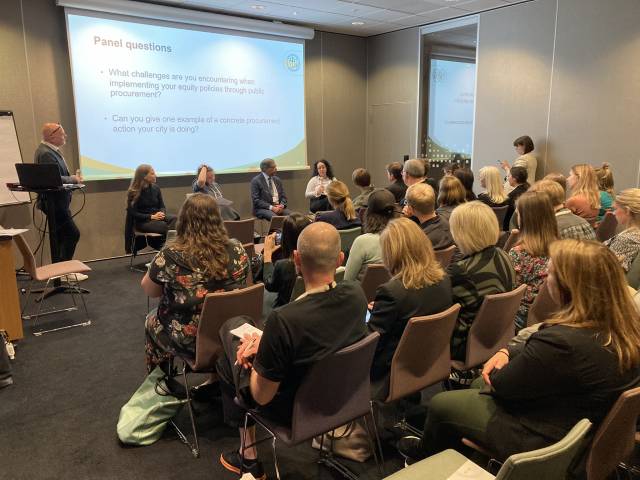Mayor of Malmö, Katrin Stjernfeldt Jammeh, speaking about building equity into public procurement practices at the ICLEI World Congress in Malmö, is putting words into action. The city has been committed to equitable and sustainable public procurement for many years, making social responsibility in tenders just as important as environmental sustainability.
Mayor Jammeh believes that now is the time for more cities to follow Malmö’s example. “The Covid-19 pandemic had already exposed supply-chain vulnerabilities, disrupting the flow of raw materials and finished goods, when the Russian invasion of Ukraine further weakened global supply chains, jeopardising food and energy security, forcing many countries to reconsider their energy supply. In light of these shocks to supply chains, the links between sustainable public procurement and supply chain resilience have become clearer and an issue to address as a matter of priority.”
Malmö’s Mayor believes that the case for using procurement to reduce our reliance on fossil fuels and ensuring that suppliers meet ethical and environmental standards has never been stronger, arguing that procurement can be used to create more equitable, resilient and sustainable local communities. “If strategically used, procurement practices can enable a green transition, create new employment opportunities, new market opportunities for start-ups and small and medium sized firms, provide decent working conditions in global supply chains, and promote gender equality. At the same time, procurement can also support cities in making financial savings whilst delivering better public services in more efficient and effective ways.”
During the session Mayor Jammeh was supported by speakers from Pittsburgh (USA), Metro Vancouver (Canada) and Rio de Janeiro (Brazil), who all shared their own stories of using public procurement as a tool for social and ecological resilience, contributing to attractive local communities, and a pandemic recovery based on the principles of social justice, equality and inclusion. With their examples they showed that by supporting minority-owned SME’s, providing decent working conditions in global supply chains and promoting gender equality, public buyers have a lot of power to boost local economies, create a green shift, and foster a just transition.





